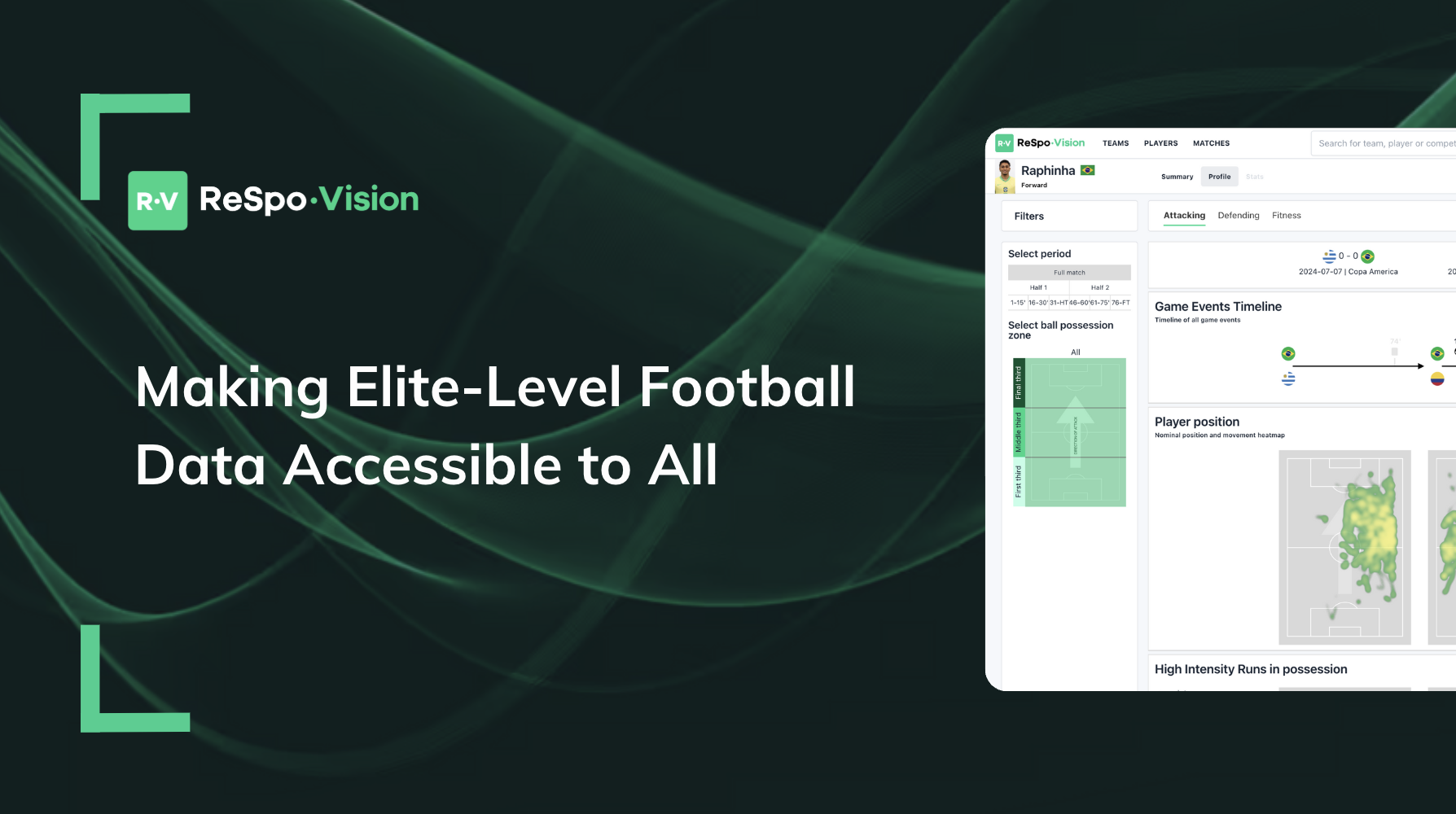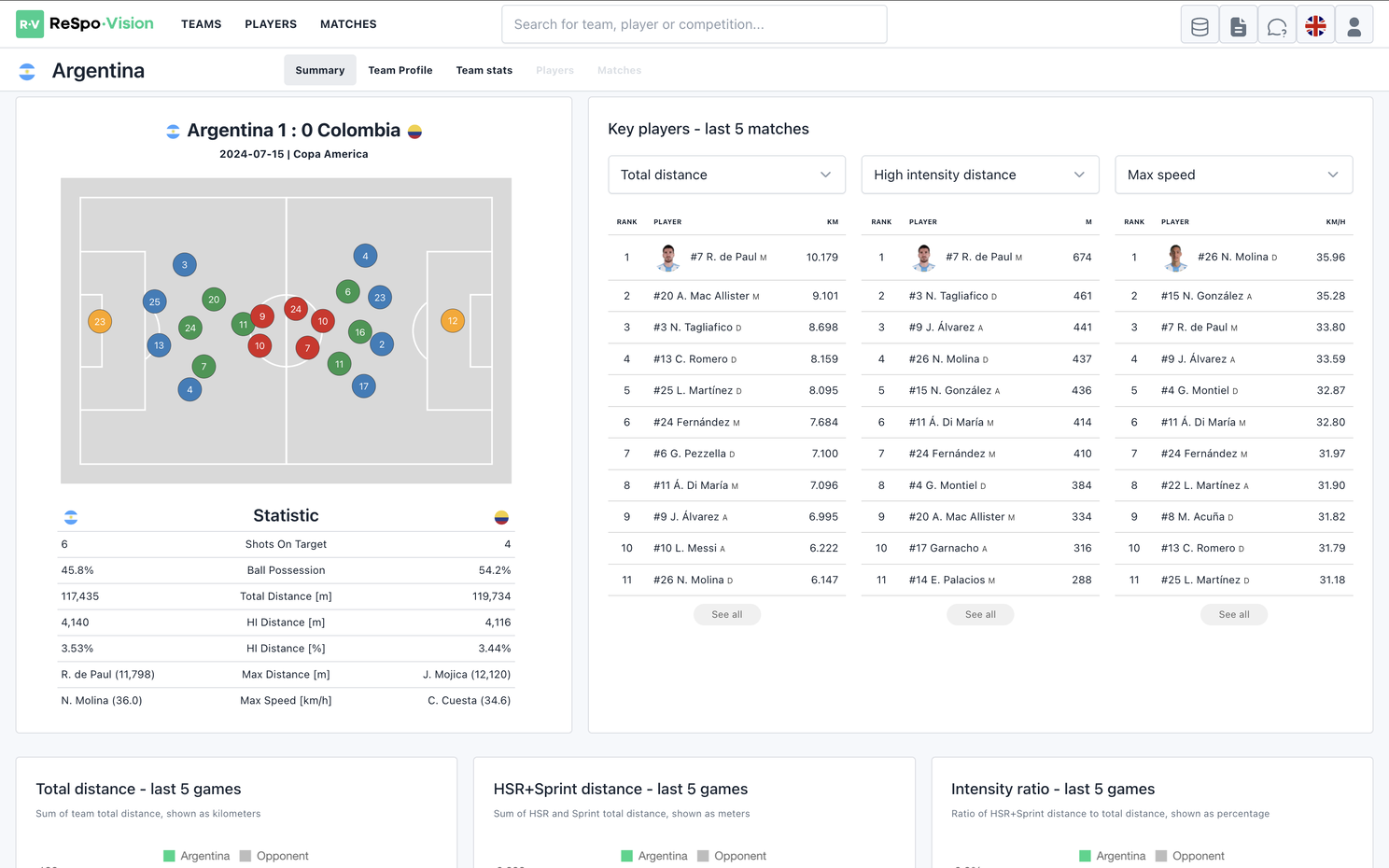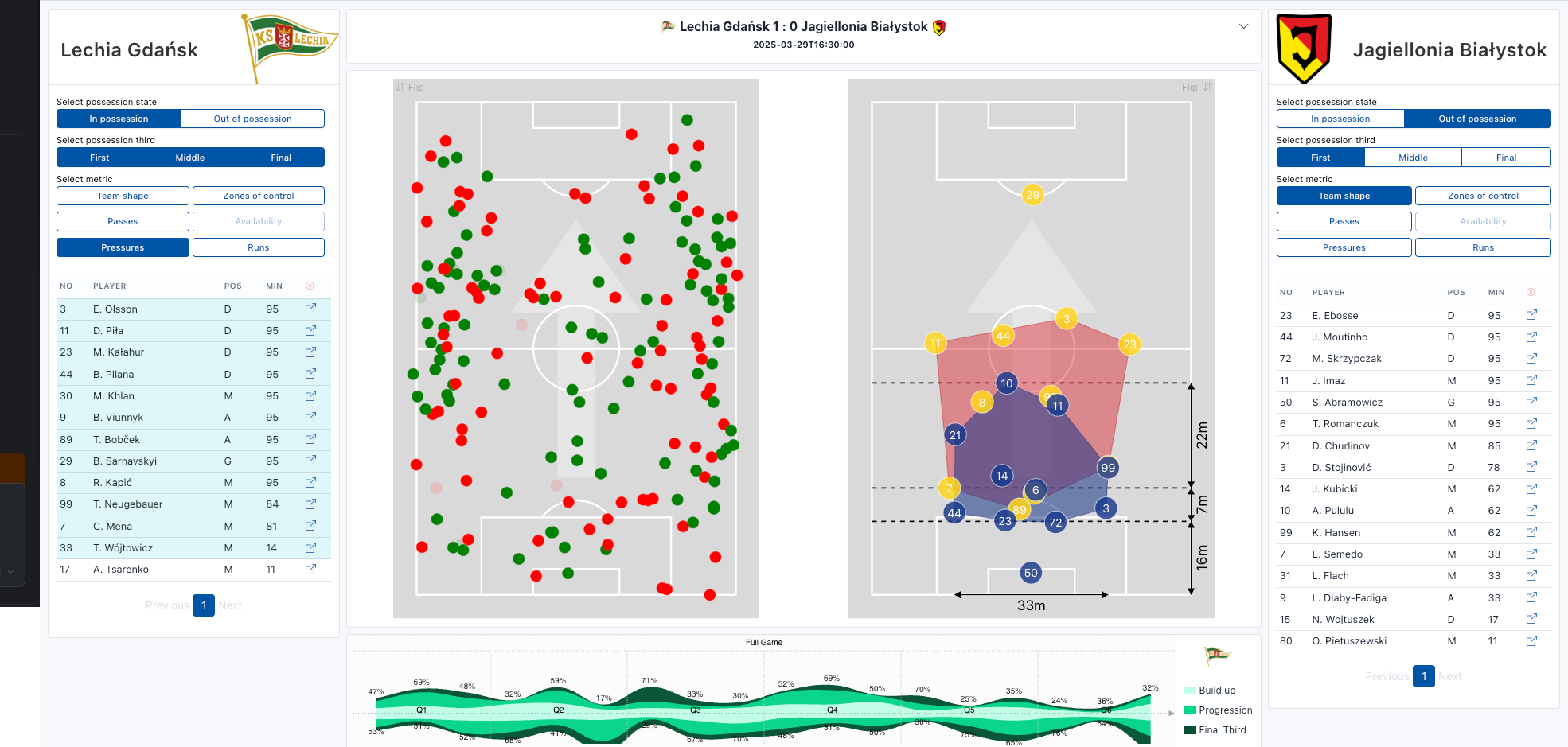
Making Elite-Level Football Data Accessible to All

In modern football, data has moved from being a luxury to a necessity, shaping how clubs prepare, compete, and improve. But while the top of the pyramid has been transformed by advanced analytics, much of the sport still operates in the dark.
The reality is clear: most high-quality tracking data remains out of reach. Whether you're a second-division club, a youth academy, or a national federation operating on tighter budgets, the tools that drive success at the highest level have often felt like a luxury, being expensive, complex, and built for someone else. At Respo.Vision, we believe, needs to change.
In this article, we’ll explore why access to elite data is still so uneven and why that matters. We’ll explain how we developed a cutting-edge technology to bridge the gap, delivering rich, actionable insights at a radically lower cost. We’ll also show how clubs and organisations at every level of the game can now make smarter decisions, perform better, and ultimately win more.
1. The Data Divide in Football: Why Access Still Isn’t Equal
At the game's highest levels, clubs and national teams increasingly rely on tracking technologies to refine tactics, monitor player movements, and inform key decisions, both on and off the pitch. And these insights are no longer considered a competitive edge; they are becoming more and more foundational to how the game is played and managed.
However, the ability to consistently capture and act on this level of data is not yet universal. Many advanced systems, like multi-camera optical tracking setups, were originally developed with top-tier clubs in mind. While wearable GPS solutions like Catapult or STATSports have since become widespread across even lower professional divisions, optical tracking setups can still require significant investment, permanent infrastructure, or integration with existing broadcast workflows, making adoption more challenging for organisations with different resource profiles.
Take second and lower-division clubs. They often play in shared or rented stadiums where they have little control over the infrastructure. Installing permanent camera systems isn’t always permitted, even when possible. National federations can face a different challenge: consistency. With matches played across multiple stadiums, sometimes internationally, maintaining a standardised, high-quality tracking setup can be logistically complex. Even with broadcast feeds available, access to the underlying data infrastructure may be limited or inconsistent.
One other concrete example is at the development level. Academies and youth teams rarely have access to venues equipped with advanced technology. Their matches may be filmed for internal review, but collecting positional or tactical data at scale remains out of reach. These organisations are committed to performance, yet often operate without the tools that could accelerate it.
In each of these cases, the issue isn’t a lack of interest or ambition. It’s the reality that most traditional systems were built with a narrow set of use cases in mind.
At ReSpo.Vision, we believe that we can change this reality. As the role of data continues to grow across the football industry, more clubs and federations must have the opportunity to tap into its full potential. With the right technology, high-quality tracking data can become more flexible, more accessible, and more scalable, supporting a broader range of teams in making smarter decisions and building a long-term culture of performance.
2. Breaking Barriers: How at Respo.Vision We Level the Playing Field
At ReSpo.Vision, we’ve developed a new approach to performance analysis and tracking. One that rethinks the technical and economic barriers that have long defined the industry.
Instead of relying on multi-camera systems installed throughout a stadium or GPS wearables restricted to training environments, our platform uses advanced AI and computer vision to extract precise 3D tracking data from a single video feed, either the standard broadcast or a tactical camera.
This means we can deliver rich, frame-accurate positional data of players, ball, and referees without physical installation, wearables, or specialist operators. Our system is fully remote, infrastructure-light, and designed to adapt to the realities of clubs and federations operating in diverse environments.
Our core tracking technology is FIFA-certified and already in use in major international and domestic competitions, where it’s helping top-tier teams generate performance insights without adding complexity to their matchday operations.
The result is a fundamentally more scalable solution. By removing the traditional cost drivers, we’re able to offer a level of insight comparable to legacy multi-camera systems, but at a fraction of the cost. For many organisations, that means unlocking capabilities they’ve previously considered out of reach.
And the advantage goes beyond cost. Because our solution requires only a single camera feed, something that most already have, implementation is fast, flexible, and frictionless. Clubs can get started without changing how they work or committing to long-term infrastructure projects.
3. The Real Impact: Better Decisions, Better Performance, Better Results
When organisations adopt ReSpo.Vision, they unlock a new level of insight that reshapes how they prepare, analyse, and perform. Whether it’s match-by-match tactical breakdowns or long-term player development, our platform turns raw positional data into tangible, decision-ready intelligence.
Our clients receive rich datasets and post-match reports that include full physical metrics and comprehensive tactical insight. These outputs are accessible via online dashboards or API, designed to fit into existing analysis workflows. But more importantly, they open new analytical possibilities that were previously unavailable or unaffordable.

Tactical Use Cases with Real Impact
For professional analysts, the value lies in the detail. ReSpo’s data supports, among others:
- Post-match analysis: quantifying pressing actions, team compactness, or off-ball positioning.
- Opposition prep: identifying common patterns, key strengths, and weaknesses of the next opponent
- Player development: tracking physical output and key tactical KPIs over time.
- Tactical refinement: visualising team structure, transitions, and shape in ways that video alone can’t show.
As one concrete example, a national football competition partnered with us to deliver tracking and AI-generated insights for dozens of matches, including team and player reports, referee performance summaries, and tournament-wide analytics. Data was captured entirely from a single tactical camera, with no hardware or wearables required, and delivered in web dashboards and raw formats within hours.
These insights allowed participating teams to understand average positioning, formation distances, pressing patterns, and physical exertion metrics across every phase of play. It provided coaches and analysts with faster, more structured ways to prepare for opponents, assess performance, and inform recovery protocols.
In another case, a historic European club integrated ReSpo’s tracking data into its analysis process for youth and women’s teams, areas that previously lacked access to any positional data. By introducing tracking data and tracking-derived metrics into regular match analysis, coaches were able to quantify off-ball movement, measure pressing actions, and standardise development benchmarks across squads.
“Before, we couldn’t even quantify certain things, now we can. We can say, ‘You pressed 130 times in that game, compared to 120 in the previous one.’ Before, it was just watching the video and thinking, ‘We pressed a lot, didn’t we?’ But that’s not a number, is it?”
Through collaborations like these, we help build a data culture. We enable forward-thinking clubs and federations to go beyond intuition, create their own KPIs, and make analysis a core part of player development and team strategy.
Whether it’s at an academy or on the international stage, our platform saves time, sharpens decision-making, and raises the ceiling of what’s possible, for any team, anywhere.

Conclusion
As football becomes increasingly shaped by data, insight and innovation mustn’t be reserved for the few. At ReSpo.Vision, we’ve built a solution that removes the traditional barriers to entry, eliminating the need for hardware, complex setups, or large operational teams.
By levelling the playing field, we’re helping clubs and federations not only perform better today, but build a long-term data culture that will support smarter decisions for seasons to come. If you’re ready to explore how data can drive your next competitive edge, we’d love to show you what’s possible.











